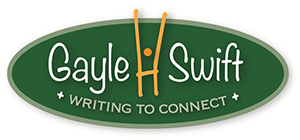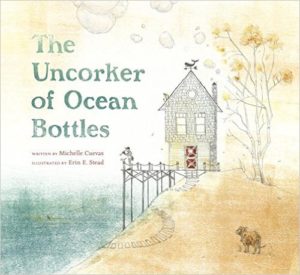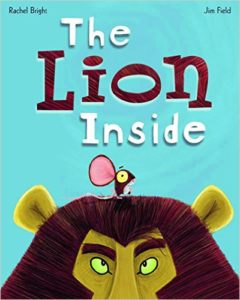
Inside of each of us lives an Inner Lion. Sometimes he is dormant but he is always there waiting for us to tap into our powerful potential. Even adults often struggle to remember this “hero within” so it is vital for us to help children discover and embrace their Inner Lion. This hero exists in all of us regardless of our stature or age. But he must compete with the other voices inside our heads-the ones who broadcast, fear, self-doubt, timidity and despair
The Lion Inside by Rachel Bright and illustrated by Jim Field brilliantly demonstrates that the most powerful person in my life is me. It also hammers home the truism “Never judge a book by its cover.” So often the face we present to the world hides our genuine selves, the selves that our both brave and fearful, confident and cautious.
When we (both kids and adults) make judgments about others based on externals, we overlook the opportunity to connect with the whole person and all of us lose the chance to be genuine. Ironically, we often treat ourselves no better and criticize ourselves with the same harsh judgment!
Fields’ fabulous illustrations carry a lot of the story’s message. The difference in size between the tiny mouse and the huge lion reinforces the immensity of the mouse’s decision to confront the lion. By connecting to his Inner Lion he awoke the bravery needed to accomplish his goal. Taken from the lion’s perspective, the reader experiences the other side of the equation. Physical size doesn’t protect one from fear. Courage does. Courage acknowledges fear and still chooses to act.
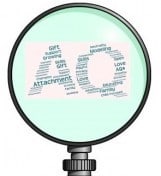 Adoption-attuned Lens: All kids strive to find their niche in school, their neighborhoods, etc. Adoptees also must learn to find their comfort spot in their new families. Sometimes they can feel as mismatched and powerless as this little mouse when he faced the roaring lion. This story invites readers to consider that beyond stature and externals, each of us has important skills and gifts to contribute, fears to overcome, and opportunities to grow. Each family member benefits from being part of the larger whole. Diversity enriches families. And classrooms, neighborhoods and communities.
Adoption-attuned Lens: All kids strive to find their niche in school, their neighborhoods, etc. Adoptees also must learn to find their comfort spot in their new families. Sometimes they can feel as mismatched and powerless as this little mouse when he faced the roaring lion. This story invites readers to consider that beyond stature and externals, each of us has important skills and gifts to contribute, fears to overcome, and opportunities to grow. Each family member benefits from being part of the larger whole. Diversity enriches families. And classrooms, neighborhoods and communities.
All of us yearn to be included, to have friends and to be appreciated. The Uncorker of Ocean Bottles written by Michelle Cuevas and illustrated by Erin E. Stead tackles this idea from a nuanced perspective. Pastel images convey the watery context of both ocean and fantasy world and strike the perfect note of mystery and dreaminess.
Cuevas writes that the main character–the Uncorker of Ocean Bottles–“Had no name.” This choice is brilliant because his anonymity renders him as “Everyman” that part of all human beings, kids and adults, who crave recognition and validation. The Uncorker dedicates himself to his life task: ensuring that he locates the rightful recipient for every message in a bottle he discovers. Through his diligent efforts, he finds purpose, steps beyond his own loneliness and engages with others. His actions solve his “problem.” He is so pleased with the results of his efforts, he commits to repeating his efforts. Young readers will recognize the great model he sets.
 Adoption-attuned Lens: Action is key to overcoming fear, creating connection and displacing loneliness. This book helps adopted children to see the benefits of reaching out instead of waiting for others to reach out first. (This is not to shift the burden of creating family connection from the parents but rather to show kids how they can contribute to the process.)
Adoption-attuned Lens: Action is key to overcoming fear, creating connection and displacing loneliness. This book helps adopted children to see the benefits of reaching out instead of waiting for others to reach out first. (This is not to shift the burden of creating family connection from the parents but rather to show kids how they can contribute to the process.)
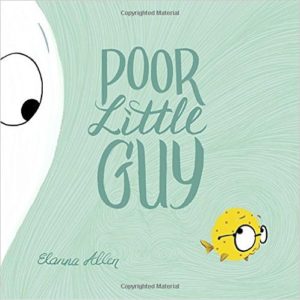 Poor Little Guy written and illustrated by Elanna Allen also focuses on the relationship between stature, fear and, courage. Allen conveys a lot of information in her illustrations which include only two characters: an octopus and a tiny, tiny wide-eyed, bespectacled fish. Immense disparity in their size highlights why the fish feels threatened by the octopus.
Poor Little Guy written and illustrated by Elanna Allen also focuses on the relationship between stature, fear and, courage. Allen conveys a lot of information in her illustrations which include only two characters: an octopus and a tiny, tiny wide-eyed, bespectacled fish. Immense disparity in their size highlights why the fish feels threatened by the octopus.
At first glance readers might think the octopus is playing with the fish. The octopus’ immense arms transform into many things–a fish-sketball net, a complex maze, a bird-cage, etc. Soon it becomes clear that he is actually “toying” with the fish. Each transformation is intended to remind the fish of the octopus’ size, strength and power to control the little fish.
Until the octopus mentions how tasty he thinks the little guy will be. His threat awakens the Inner Lion of the fish. He draws on his courage and his ability to defend himself. The reader discovers that the little fish isn’t so helpless after all. He uses his special skill to successfully defeat the octopus’ evil intentions. Read the book to find out exactly how he accomplishes this! Don’t we all love it when the underdog–er, underfish– is victorious?
 Adoption-attuned Lens: It is important for kids to recognize how they can stand up for themselves and tap into their ability to be agents of their own success. For adopted children who sometimes encounter bias and bullying because they were adopted, this message of self-advocacy is an important one. Again, this point is not intended to invalidate their experiences. Rather it is meant to add a skill with which they can cope. Dismissing or trivializing bullying does not address the situation!
Adoption-attuned Lens: It is important for kids to recognize how they can stand up for themselves and tap into their ability to be agents of their own success. For adopted children who sometimes encounter bias and bullying because they were adopted, this message of self-advocacy is an important one. Again, this point is not intended to invalidate their experiences. Rather it is meant to add a skill with which they can cope. Dismissing or trivializing bullying does not address the situation!
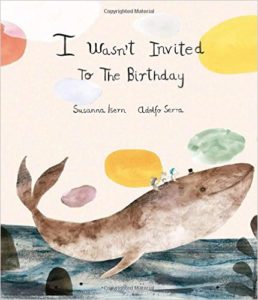 I Wasn’t Invited to the Birthday written by Susanna Isern and illustrated by Adolfo Serra addresses the universal experience of being left out. No one enjoys feeling invisible, inferior or, unaccepted. Among children these slights often occur “publicly” when kids distribute invitations at school. Even in classrooms where that practice is forbidden, kids talk about upcoming events which can leave the uninvited kids feeling bleak and marginalized.
I Wasn’t Invited to the Birthday written by Susanna Isern and illustrated by Adolfo Serra addresses the universal experience of being left out. No one enjoys feeling invisible, inferior or, unaccepted. Among children these slights often occur “publicly” when kids distribute invitations at school. Even in classrooms where that practice is forbidden, kids talk about upcoming events which can leave the uninvited kids feeling bleak and marginalized.
The gift of this book is how it shows kids a way to take control. They can choose to look beyond the ranks of the “in crowd” to find friendship. (Commonly, a child’s first instinct is to shun others who are on the margins in the hope that they will be “tainted” by befriending an unpopular child. Unfortunately, fear drives them to collude in the ostracizing of other children.)
In this story, however, the uninvited kids band together. The story takes a fantasy vibe and the kids “enjoy an unforgettable afternoon.”
 Adoption-attuned Lens: For kids wrestling with feelings of rejection–which almost all adoptees report at some time in their lives–reading a story of finding ones “group” is helpful. Perhaps that means befriending other adoptees, or kids who share the same passion for a common interest–sports, the arts, etc. Whatever that common ground is, it is important to reach out and search for it.
Adoption-attuned Lens: For kids wrestling with feelings of rejection–which almost all adoptees report at some time in their lives–reading a story of finding ones “group” is helpful. Perhaps that means befriending other adoptees, or kids who share the same passion for a common interest–sports, the arts, etc. Whatever that common ground is, it is important to reach out and search for it.
As mentioned in the previous review, this point is not intended to invalidate their experiences. Rather it is meant to add another coping skill. Dismissing or trivializing their experience does not fix the problem.
Our theme for #DiverseKidLit in February is Love. Please consider sharing diverse books and resources that support love and families. (As always, the theme is only a suggestion. Diverse posts on alternate topics are always welcome.)
What Is #DiverseKidLit? Diverse Children’s Books is a book-sharing meme designed to promote the reading and writing of children’s books that feature diverse characters. This community embraces all kinds of diversity including (and certainly not limited to) diverse, inclusive, multicultural, and global books for children of all backgrounds.
We encourage everyone who shares to support this blogging community by visiting and leaving comments for at least three others. Please also consider following the hosts on at least one of their social media outlets. Spread the word using #diversekidlit and/or adding our button to your site and your diverse posts.

We hope this community will grow into a great resource for parents, teachers, librarians, publishers, and authors! Our next linkup will be Saturday, February 18th and on the first and third Saturdays of every month.
Upcoming Theme
Our theme for the current month is Love. Themes are a suggestion only; all diverse book posts are welcome. If you’re interested, you can start planning now for our upcoming themes …
- February 18th linkups: Love. Let’s continue to spread our love of diverse books by sharing diverse books about love, families, and relationships.
- March 4th and 18th: Changing Seasons. As we eagerly await the beginning of Spring in the Northern Hemisphere and Autumn in the Southern, let’s share favorite books and resources on the seasons.
Most Clicked Post from Last Time
Our most-clicked post from last time was Marjorie’s review of IBBY Review: Roses Are Blue by Sally Murphy and Gabriel Evans on Mirrors Windows Doors. This novel in verse shares the struggles of a young girl trying to process her new life after her mother is severely injured in a car accident.
My DiverseKidLit Shout-Out
Now more than ever, we need to share and promote books by and about Muslims, and a great place to start is Kitaab World‘s new series on Countering Islamophobia through Stories. The first entry is a book list featuring Muslim Kids as Heroes.
I am also delighted to welcome Gauri, CEO and co-founder of Kitaab World, as a co-host!
#DiverseKidLit is Hosted by:
Marjorie @ Mirrors Windows Doors Blog / Twitter / Facebook / PinterestMia @ Pragmatic Mom Blog / Twitter / Facebook / Pinterest / Instagram
Myra @ Gathering Books Blog / Twitter / Facebook
Want to be notified when the next #diversekidlit linkup goes live? Click here to join the mailing list.
Interested in joining as a host or an occasional co-host? Contact katie at thelogonauts.com.
(Never participated in a linkup before? Please click here for a more detailed step-by-step.)
Get #DiverseKidLit Recommendations on Pinterest!
Gauri @ Kitaab World an online bookstore for South Asian children’s books, toys and games
Blog / Twitter / Facebook / Instagram
Shoumi Sen, Author of Toddler Diaries Blog / Twitter / Facebook
Our Pinterest board highlights a wide range of amazing posts and resources for Diverse Children’s Books. Please consider following the board for even more great books!
